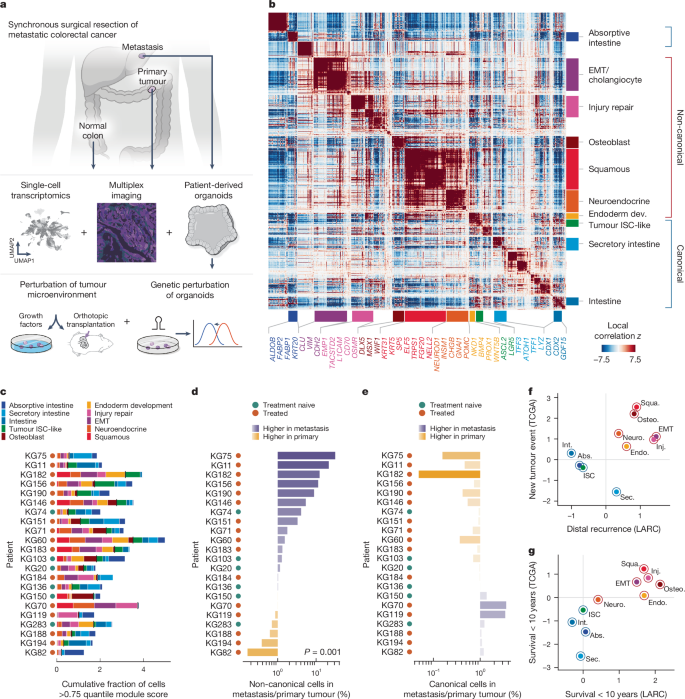Progressive plasticity during colorectal cancer metastasis
IF 50.5
1区 综合性期刊
Q1 MULTIDISCIPLINARY SCIENCES
引用次数: 0
Abstract
As cancers progress, they become increasingly aggressive—metastatic tumours are less responsive to first-line therapies than primary tumours, they acquire resistance to successive therapies and eventually cause death1,2. Mutations are largely conserved between primary and metastatic tumours from the same patients, suggesting that non-genetic phenotypic plasticity has a major role in cancer progression and therapy resistance3–5. However, we lack an understanding of metastatic cell states and the mechanisms by which they transition. Here, in a cohort of biospecimen trios from same-patient normal colon, primary and metastatic colorectal cancer, we show that, although primary tumours largely adopt LGR5+ intestinal stem-like states, metastases display progressive plasticity. Cancer cells lose intestinal cell identities and reprogram into a highly conserved fetal progenitor state before undergoing non-canonical differentiation into divergent squamous and neuroendocrine-like states, a process that is exacerbated in metastasis and by chemotherapy and is associated with poor patient survival. Using matched patient-derived organoids, we demonstrate that metastatic cells exhibit greater cell-autonomous multilineage differentiation potential in response to microenvironment cues compared with their intestinal lineage-restricted primary tumour counterparts. We identify PROX1 as a repressor of non-intestinal lineage in the fetal progenitor state, and show that downregulation of PROX1 licenses non-canonical reprogramming. Colorectal cancer metastasis involves dramatic plasticity and loss of PROX1-mediated repression of non-intestinal lineages.


结直肠癌转移过程中的渐进可塑性
随着癌症的发展,它们变得越来越具有侵袭性--转移性肿瘤对一线疗法的反应不如原发肿瘤,它们对连续的疗法产生耐药性,最终导致死亡1,2。来自同一患者的原发性肿瘤和转移性肿瘤之间的突变在很大程度上是一致的,这表明非基因表型的可塑性在癌症进展和耐药性中起着重要作用3,4,5。然而,我们对转移细胞状态及其转变机制缺乏了解。在这里,我们在一组来自同一患者的正常结肠癌、原发性结肠癌和转移性结肠癌的三组生物样本中发现,虽然原发性肿瘤主要采用 LGR5+ 肠干细胞样状态,但转移瘤显示出渐进的可塑性。癌细胞失去肠细胞特性,重编程为高度保守的胎儿祖细胞状态,然后进行非规范分化,形成不同的鳞状和神经内分泌样状态。通过使用匹配的患者衍生器官组织,我们证明与肠系受限的原发肿瘤细胞相比,转移细胞在响应微环境线索时表现出更大的细胞自主多系分化潜能。我们发现 PROX1 是胎儿祖细胞状态下非肠系膜的抑制因子,并证明下调 PROX1 会导致非规范重编程。
本文章由计算机程序翻译,如有差异,请以英文原文为准。
求助全文
约1分钟内获得全文
求助全文
来源期刊

Nature
综合性期刊-综合性期刊
CiteScore
90.00
自引率
1.20%
发文量
3652
审稿时长
3 months
期刊介绍:
Nature is a prestigious international journal that publishes peer-reviewed research in various scientific and technological fields. The selection of articles is based on criteria such as originality, importance, interdisciplinary relevance, timeliness, accessibility, elegance, and surprising conclusions. In addition to showcasing significant scientific advances, Nature delivers rapid, authoritative, insightful news, and interpretation of current and upcoming trends impacting science, scientists, and the broader public. The journal serves a dual purpose: firstly, to promptly share noteworthy scientific advances and foster discussions among scientists, and secondly, to ensure the swift dissemination of scientific results globally, emphasizing their significance for knowledge, culture, and daily life.
 求助内容:
求助内容: 应助结果提醒方式:
应助结果提醒方式:


